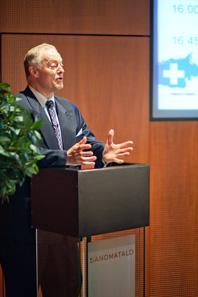
Jaakko Rauramo, Chairman of the Board of Sanoma, shares his thoughts about corporate responsibility and Sanoma’s motivation to support the Clean Baltic Sea projects of the John Nurminen Foundation. This is a shortened version of the interview done in March 2011 for the annual report of the Foundation. Jaakko Rauramo was interviewed by Tuula Putkinen.
Jaakko Rauramo, Chairman of the Board of Sanoma, begins with terminology. According to Rauramo, since companies do not have powers of decision in society, and consequently no means of truly influencing society, we cannot speak of ‘corporate social responsibility’. Corporate responsibility entails first and foremost the companies’ task of creating jobs and tax income. But there are other tasks. Rauramo says that ‘decent behaviour’ is an important guideline also in business. ‘All successful companies that have been around for a long time have in one way or another adhered to this principle. That should suffice as corporate responsibility report.’
Rauramo points out that only money that shareholders have decided to give away in the general meeting can be directed to charities. Shareholders give up a certain share of their dividends, allowing for the funds to be used for purposes that do not directly benefit the everyday operations of the company. All other funds must be used responsibly for the advancement of the company’s business.
Rauramo will not take the oft-repeated mantra that truly responsibly companies should do more than is required by laws and decrees without a pinch of salt. He asks us to think about where the impact of doing more will truly be reflected in the end. What stakeholder groups will suffer when more is done to benefit another group? Will this impact product prices, employee salaries, shareholder dividends or supplier terms and conditions? We have to follow the chain of thought all the way through :in most cases, by ‘doing more’ companies are seeking some kind of profit.
According to Rauramo, this is most important in terms of employees. Cutting raw material costs will hurt no-one, but it is always worth considering if a company can afford to take a softer stance with its employees. In the long run, this will turn out to be a solid investment in the company’s reputation as an employer.
In the words of this seasoned media tycoon, decent behaviour is epitomised by the phrase ‘Don’t do anything that you do not want to read about in tomorrow’s papers.’ If you need to think if a venture is in line with responsible behaviour, it is wisest not to go ahead with it.
The Baltic Sea versus climate change
In terms of sustainable development and carbon footprints, Sanoma is ‘easy’. Rauramo prompts us to think of scale: with the carbon footprint of one flight to Thailand, you can subscribe to Helsingin Sanomat for 45 years. ‘Have you ever seen a list where the carbon footprints of companies are listed by size?’ If such a list existed, the scale they use would probably not go low enough for Sanoma to be listed; this is how small the company’s carbon footprint is.
What Rauramo wants to do is call in question the heated climate change discussion that is ongoing also in Finland, and challenge us to consider the matter from a national perspective. He says that it is pointless for Finns to ‘overachieve’ and risk the competitive edge of the Finnish industry by doing more for the environment than any European country on average does.
Rauramo does not want to belittle climate change on the global level, but he says we should consider what, in terms of the environment or the carbon footprint, are worthwhile actions in Finland. What is the true impact of our actions? The growth of carbon dioxide emissions globally during the past five years corresponds to 150 years of emissions generated in Finland. Finnish carbon dioxide emissions constitute roughly one per mille of the world’s emissions. ‘Should Finland cease to generate carbon dioxide emissions or, alternatively, double them, this is a change that we could practically not even measure or verify.’
This is precisely why, compared to the climate change discussion, the Baltic Sea is a concrete and important target. ‘Because the Baltic Sea can still be saved.’ Rauramo says that the Baltic Sea cannot be saved with the donations of any individual company. But when we all pitch in, we can strengthen the general conviction that the Baltic Sea can be saved through cooperation. ‘This is a practical project.’ ”
Many companies that support the John Nurminen Foundation Clean Baltic Sea projects also seek to profit from the sponsorship. Rauramo is more specific on the role of Sanoma. The purpose of the media space donations is indeed to profit Sanoma through improved corporate image and corporate reputation, for example. Monetary donations, on the other hand, have been made on the basis of annual general meeting decisions, and they do not seek to benefit the company’s marketing communications directly.
Since 2006, Sanoma has been a major supporter of the work of the John Nurminen Foundation. The support has consisted of both monetary donations, and donations of advertising and media space in various Sanoma media.
